#or specialists for jewish history
Explore tagged Tumblr posts
Text
-Hey, Arch?
Yes, fake audience voice?
-Why are you reblogging your question a third time?
I'm so glad you've asked! See, I've went over some historical stuff and came across a completely different answer for the first question. So, since the other reblog line (the Jewsade) has become too long, I've decided to start over.
-Why not reblog some other post that discussed that topic? Also, why the heck did you not do the proper historical research while working on the origi-
All right, that's quite enough.
So, another answer to question one! How exciting! Especially since everybody loved the original so much. So, you see, it has come to my attention that some 17th century events might have greater bearing on-
-It's because you liked the idea of the Jewsade too much, isn't it? You've spent a whole whopping Shabbat researching David Reubeni, Shlomo Molcho and John Calvin, and it was so darn exciting-
Shut up!
-on the presence of Jews in certain places by the time HDM occures at. You see, Menasseh Ben Israel-
-You were so caught up in your idea of a Jewish Messiah getting somewhere and then failing miserably. Why? Was that a commentary on the State of Israel or something?
Shut UP! I'm trying to-
-Trying to nothing, you keep allow me to break you because you enjoy this way of portraying stuff and don't have a proper outline to anything about Menasseh Ben Israel!
All right, fine! I'll admit it.
So. Umm. That.
Yeah, as my fake-audience-voice (-Hi!) said above, I did get caught up with research on David Reubeni, even though I knew about Menasseh Ben Israel's bearing on the history of Judaism at the time. The truth is, the thought hit me on my way to the Synagogue on Shabbat eve and I got so excited I kept it in mind for the entirety of the Shabbat. Then I wrote my post immediately when Shabbat ended where I live.
Those are not very important details, but I think they explain my odd focus on the Jewsade on the other post. I got excited. It was a cool - if slightly disturbing, considering its relation to the crusades - event that didn't happen in our world but could happen elsewhere. Only problem is, the alterations were slightly too early.
I don't know at what year was John Calvin elected pope in Lyra's world. However, besides it changing very little (the people who mattered for the sake of the Jewsade are the kings more than the pope), it was also likely after both Reubeni and Molcho were imprisoned by Charles V. It doean't have to be that way - slight alterations, even prior to the major deviation point, are not hard to make - but it makes it more of an independant idea.
Menasseh Ben Israel, however, held an important role in the history of Judaism, and lived during the 17th century, placing him in an easy place to be affected by this alteration. I will admit to lazyness in my historical research - when galvanized during the Shabbat I can do a lot, but Ambaric and Computing devices tend to distract me easily during the weekdays. That's a weak excuse, but this is why my reading on Ben Israel was mostly just his Wikipedia article.
Either way: Menasseh Ben Israel was the son of Porugese Anusim, forced converts. His family lived in La Rochelle for a time as a way to escape the Inquisition, but later moved to Amsterdam, where Menasseh Ben Israel spent most of the rest of his life. For the record, the time cite in Wikipedia for their move to the Netherlands is 1610.
Now, it's probably important to note that the Netherlands were only starting to become independant - there was a war, which was somewhat related to the Netherlands being mostly protestant while Spain, which sort of controlled them, was famously Catholic. This is probably significant, since most Netherlanders were not just any type of protestant - they were Calvinists.
To get to the point, though, Menasseh Ben Israel apparently attempted to explain Judaism to the Christians of the world - he was in a good position for that, I guess, having been raised in a family of Anusim. He also made efforts to convince Sweden and Britain to allow Jews to live in them, under the belief that the salvation of the Jewish people will only come once they reach the farthest corners of the Earth. He had limited success with Sweden - a small Jewish community was founded there during 1680s, but was later expelled. He didn't live to see that, though, or the eventual success of his efforts in Britain, because he died at 1657 while trying to bring his son's body to burial in Amsterdam.
To be fair, it took about a century more for Sweden to truly allow Jews in again, but Menasseh Ben Israel is, in some ways, the man who caused those two countries to accept Jews. Incidentally, if you follow Lyra's journey, most of the time she's in her own world is in one of those countries. Plus a portion in Greenland (Svalbard and Lord Asriel's hut, possibly the Station as well) and some time in India (I think? I'm pretty sure it was a mountain range in Southeast Asia in the book. In the series it was a somewhat forsaken island, IIRC). Though, considering she was unconcious for most of her time in that last place I'm not sure it counts.
Well, I just checked and it turns out there were Jews in Denmark earlier than in Sweden - it's not clear if there were Jews there during the Middle Ages, but Jews were allowed there in 1622, when Menasseh Ben Israel was about 18. So maybe I exaggarated his influence a bit. I'm not sure what bearing it has on Greenland, though. Anyway, attempting to avoid uncomfortable topics: with changes in how the church functions, a lot of stuff in Europe will change. I've said so in the other line of reblogs already, but I don't know if the Magisterium will start by giving the Inquisition more authority or close it entirely. We know that by Lyra's time the Inquisition isn't active anymore, but the hints that it was active in the past might indicate it survived Calvin's reforms to the Catholic church. So, in short, the Ben Israel family might have nowhere to go in fear of the Inquisition. It can affect Menasseh's life in a myriad of ways - he may have went to live in America, for example - and many of them can lead to no one raising to Cromwell, or whoever else might be controlling Brytain at the time, the topic of allowing Jewish return to it.
Without the Jewsade (assuming I'm dissuaded from it. I'm not yet - still attempting to work on a fanfic, which doesn't mean much considering it has been less than a week), the results of simply not having such an important figure will mostly just be no Jews in Sweden or Brytain. For the same reason Menasseh Ben Israel doesn't fulfill his function in our timeline, it may be that there won't be Jews in Denmark and Norway either. It might be that there would be mass emigration of Ashkenazi Jews to North Africa, the Ottoman Empire, or America due to expulsions. Alternatively, there will be much more Anusim.
What you may have noticed by now in this attempt at historical research and alternative history is the prominence of Portugese Anusim and Expelled people. Or you might have chucked it to the "two is a coincidence" bin. I'm not sure what to think of that myself, as I'm usually more focused on the Spanish Expulsion as a significant event for Judaism in that era. The Portugese one usually comes as an afterthought. I do think it points out to a significant fact: the Jews of the Iberian Peninsula were very well educated and strongly affected every community they got to. There were Jews in Italy prior to the Banished Sepharadim, but instead of joining those local congregations - the Sepharadim started their own. In North African and Middle Eastern Congregations they're considered to have had a significant effect on practices.
If you're wondering what I'm getting at, you should know I myself don't know. Maybe that instead of talking about some French theologian I have to focus on Spain and Portugal when talking about the History of Judaism at the beginning of the Modern Era? Also, a lot of religious development in Judaism at the time occured in the Ottoman Empire, where Rabbi Joseph Karow wrote the Beit Yosef and Shulchan Aruch. One religious and political shift in Christianity isn't enough to change that. The Jewsade possibly has the largest effect because it's shaped by European politics and will change the state of affairs for Jews in the Ottoman Empire. Other than that, though, it's just a question of more oppression or less oppression.
And I'm starting to ramble. Main takeaways:
a. Shifts in the timeline might result in Jews not only being kept out of Brytain and Sweden for the forseeable future, but also migrating from Christian countries to Muslim ones or to the newly-sprouted coloniess.
b. Most everything related to that is shaped by the Spanish and Portugese Expulsions, forced conversions and Inquisition. Considering the possibility of those expanding all over Europe, I'm not sure what role Spaniard and Portugese Jews might play. They had a significant role at this period already, to be honest, but they might even have an even bigger one here, if very different.
c. Honestly, I'm not very good at this historical research thing. I love reading lore details about alternate histories and such, and feel that Judaism is usually ignored in the grand scale of things in most works about that (excepting WW2 related works, which is something of a tired trope to my understanding), but I don't see myself as the right person to change that. I just decided to drop History as a topic for my BA, and got a barely decent grade in the only class o the topic I took this year. I'm fascinated by history, but some things in its study are slightly boring me. In short, I really want someone else to take this from me. That might be why I just wanted to see the post by the Tea Detective instead of doing all this work: I knew, if subconciously, that I don't have the willpower to do it well. So please, if anyone reading this is as interested as I am in the topic and actually knows how to do historical research, please help.
Huh. Glad to have this off my chest, but not sure I expected it.
Anyway, hope you enjoyed reading that and found it interesting. Thank you for reading, and have a good day!
All right. So, first: if you are either Jewish, like His Dark Materials, or both, please reblog. If you aren't any of those but know someone who is - please share it with them. I want to get as many thoughts on this as possible.
In essence, I just want to ask two simple questions. I have the beginnings of answers for myself, but Judaism is nothing if not full of discourse and many opinions on one topic. So, again: reblog. Share your thoughts and opinions. Hopefully, it will give us a wide variety of possibilities and answers.
The two questions are: where are Jews in Lyra's world? And what are the theological and Halachic concequences of having dæmons?
I intend to share my opinions in two separate reblogs, but please share your thoughts even if you don't see mine. The short version is that I looked about events in Jewish history around John Calvin's time for the first question (pope John Calvin being the major alternation of history in HDM). As for the second question - I have some thoughts relating to the Chabad thought stream. Elaborations, again, going in reblogs.
Thank you in advance!
(PS, question number 1 was handled once by the sadly deactivvated user the Tea Detective, though their full post disappeared. Link to a reblogging of the first half: here. Note, another reblog mentions other religions - feel free to discuss them, I'm focusing on Judaism because I'm Jewish. Another post asking this question was posted here, so have fun with it. Meanwhile, this post is about dæmons and religions in general and lightly touches Judaism.)
#judaism#his dark materials#jewish fantasy#jewish history#alternate history#please reblog#jumblr#jewblr#David Reubeni#Shlomo Molcho#at least a passing mention#also one for the Jewsade#Menasseh Ben Israel#Lyra's world#alterative jewish history#sephardi judaism#maybe the weird dialogue is my dæmon speaking#also if there are any historians who like his dark materials in the audience:#please help#mostly intended for jewish historians#or specialists for jewish history#hdm#a long post#probably too many tags but who cares by now
124 notes
·
View notes
Text
WARSAW (JTA) — In the center of Poland’s capital, a brick wall separates the humming traffic of Okopowa Street from a quiet wilderness filled with graves.
This is Warsaw’s main Jewish cemetery and one of the largest in Europe, a sprawling forest of 83 acres and the final resting place of some 200,000 Jews. Since 1806, the cemetery has held generations of cultural luminaries, rabbis and political activists — from the writers S. An-ski and I.L. Peretz to Ludwik Zamenhof, who created the international language of Esperanto, to Mark Edelman, the last surviving leader of the Warsaw Ghetto Uprising.
Some gravestones stand tall and pristine. But deeper into the cemetery, amid a tangle of maple, birch and acacia trees, more and more bend under the weight of time and neglect. Their inscriptions have faded and succumbed to ivy, leaving thousands of nameless stones in the thicket. An estimated 50,000 Jews who lie there have no stones at all — they were killed by hunger, disease or execution under the Nazis and consigned to two deep mass graves.
For decades after World War II, a long silence engulfed Poland’s Jewish history and the atrocities committed there. Nine in 10 Polish Jews were killed, many survivors left the country, and those who stayed often concealed their Jewishness under the Soviet Union. With family chains severed and few left to remember the dead, the cemetery became a forest. A place that had no trees before the war grew about 8,000 of them, while falling leaves transformed into new layers of soil and further buried the dead.
But in the last few years, a new form of life has come to the cemetery. Young people stand in between the gravestones, chattering, laughing and digging with shovels.
It’s a strange sight in a Jewish burial ground, where religious law says the dead must remain undisturbed in perpetuity. These newcomers are archaeology students from the University of Warsaw, who convinced Poland’s Jewish authorities to let them work on restoring the cemetery’s pre-war infrastructure — beneath the soil and debris piled over the untrodden paths to Jewish graves.
It started in 2020, when students discovered that COVID-19 restrictions were shutting down archaeological sites around the world. Panicked over completing the digs required for them to graduate, they asked about working in their own city at the Okopowa Street cemetery. Soon they came head-to-head with the Rabbinical Commission for Cemeteries, which protects Jewish burial sites in Poland.
Witold Wrzosinski, the cemetery director and a member of Warsaw’s small Jewish community, watched these negotiations.
“The rabbis obviously said, ‘Go away, you’re crazy — stupid idea, digging around in a Jewish cemetery,’” said Wrzosinski. “But they kept insisting.”
The students wanted to prove that they could dig without breaking Jewish law. So they studied it, returning to the rabbis over and over to demonstrate that their excavations would not disrupt the original soil.
The rabbis were suspicious, said Wrzosinski. How could the students be trusted to differentiate between old and new earth? But eventually, they allowed a survey on a small patch of land in the cemetery, watched closely by Aleksander Schwarz from the Rabbinical Commission.
Schwarz had distinct credibility with Poland’s Jewish leaders. A specialist in Jewish cemetery and burial law, he has served the commission for 25 years, mostly overseeing searches of unmarked graves in death camps like Sobibor and Belzec. Polish Chief Rabbi Michael Schudrich sent Schwarz to live for days at these camps, supervising archaeologists as they drew the historic borders of burial sites while ensuring that they met religious rules.
Before the project on Okopowa Street, Schwarz had never taught archaeologists to work in a Jewish cemetery. But he agreed to it. Over the past four years, with funding from Poland’s Cultural Heritage Foundation, he has trained senior archaeologists and a rotating group of about 30 students. Everyone has to pass through his lectures and learn to dig under his eye, said Schwarz, who calls himself “a very demanding person.”
He tempers the typical archaeologist’s appetite to dig deep. Instead, he teaches them to interpret soil, a practice of care and imagination. The historical level of the cemetery lies only 20 to 30 centimeters below the surface. Students are never to disturb a grave — and if they happen on human remains, they must quickly block off the area and leave their discovery untouched. One mistake here could prompt Schwarz to end the project.
“We have trained them not to pick up any bones,” he said. “They work a bit like forensic technicians. If they find anything that is very shallow, a bone or a fragment of a bone, then they call me — or I’m already there — and the commission makes a decision about what happens.”
The students were spurred by an early victory: They uncovered a cobblestone path from the cemetery’s original layer. As far as Wrzosinski knows, no one in Warsaw remembered this path ever existing. Now it is an ordinary part of the place again, near the entrance, gently guiding visitors between the graves.
Gradually, the students were allowed to work in more and more sections of the cemetery. They found fallen, buried tombstones and the names of people buried there. Some of these records did not exist anywhere else, since the Nazis destroyed the pre-war cemetery archive and many Jewish birth, marriage and death certificates.
Some discoveries remain mysterious. Nineteenth-century gravestones that turned out to be half-buried had surprises waiting just below the surface, such as sculptures of squirrels and dragons that looked unfamiliar on Polish Jewish graves, said Wrzosinski. Rabbis are still interpreting whether they had any symbolic significance.
There were also remnants of war, like bullets and shells, bullet holes in gravestones and a pistol from the Warsaw Uprising that was typical of the Polish Underground. One day in July 2020, the students discovered an unexploded German mortar just seven centimeters below the surface. Police evacuated the cemetery and a bomb squad quickly removed it without any damage.
Kacper Konofał, a 23-year-old archaeology student working in the cemetery, is writing his bachelor’s thesis about an uncovered collection of glass vessels, likely used for the ritual washing of bodies. For Konofał, the project has opened access to a world that only lived in vague stories from his childhood. His great-grandmother used to speak about her childhood friend, who was Jewish, and her father, who carried Jews to Sobibor in his cart on German orders.
“When I arrived there on the first day, it was something extraordinary — a calm, quiet, almost magical world behind the wall, in the center of a huge city,” said Konofał.
Wrzosinski also discovered this world as a student, long before becoming the cemetery’s director. Growing up as a secular Jew in Warsaw during the 1980s and ‘90s, he always knew he had family buried in the cemetery, but he never went there. Without a registry, there was no way to look for graves — and without knowing the Hebrew alphabet, there was no way to read them.
Wrzosinski made his way to studying Hebrew at the University of Warsaw. In 2006, near the end of his degree, he saw a job ad seeking someone to clean and index the cemetery. He began the ongoing endeavor to catalog every gravestone in an online database. So far, Wrzosinski and his colleagues have indexed 82,372 names and inscriptions.
He found pleasure in decoding the language of the stones, where Polish and Jewish life intertwined: Hebrew letters, written in Yiddish to spell Polish surnames. Then, in 2008, he found his great-great-grandfather.
Wrzosinski knew he would eventually see the graves of his ancestors, and he supposed it would be satisfying to know where they were. But the discovery changed him more than he expected.
“When I stepped on that stone and I cleaned it, and I realized that’s my ancestor, I felt something stronger, different,” said Wrzosinski. “Kind of a sense of belonging to this weird place — just an orphaned stone in a neglected forest, and it’s somehow mine. I needed to take a few deep breaths and stop for a moment.”
Now, Wrzosinski has found seven direct relatives to visit in the cemetery. He believes that his great-grandfather lies in one of the mass graves, although he cannot know for certain. Through his database and the efforts of the student archaeologists, he is gratified to watch other visitors experience the same moment of connection that he did.
Even during its long abandonment, the cemetery remained important for many who experienced the loneliness of being Jewish in postwar Poland. Patrycja Dołowy, a writer and artist who formerly headed Warsaw’s Jewish Community Center, grew up like Wrzosinski in Warsaw during the 1980s. Being Jewish was mostly an unspoken subject in her family, both publicly and at home.
But she saw the wildly overgrown cemetery as a “secret garden,” a refuge for Polish Jews that mirrored the obfuscated memory in their own homes. “Those stones, the matzevot, the names on them were covered by nature, not so visible — a little bit like in our memories, the names of our ancestors, and these gaps in our family histories,” said Dołowy.
Dołowy said her community was happy to see the archaeological restoration, of a piece with other efforts to revive Jewish heritage across Poland. She also believes the wildlife that grew over the cemetery is inextricable from its story, even as the trees continue to battle against the graves.
“Nature heals what was so difficult, so unimaginable,” said Dołowy. “In my opinion, this overgrowth should be an important part of places like cemeteries. But there’s always a dilemma, because nature is also destroying the graves.”
174 notes
·
View notes
Text
Fan Labor Golden Needles
At the time of posting, we still have 26 glorious fan labor auctions that have no bids. That means this could be your chance to make a small donation and get some help with beta reading, sensitivity reading, specialist expertise, or even some more unique offers!
astriiformes is offering Culture picking, Sensitivity reading, Specialist expertise, and Research for ANY fandom. They list the following areas of expertise:
Jewish & American culture-picking, sensitivity reading for Jewish, aromantic, asexual, transgender (especially transmasculine), ADHD, autistic, and chronically and mentally ill characters, as well as writing queerplatonic relationships. Specialist expertise: Archives and archival work, stringed instruments and orchestras, queer history, scientific & medical history, historical research
birbleafs is offering Betaing for Genshin Impact; Star Wars (Original Trilogy, Prequel Trilogy, The Clone Wars, Legends / Extended Universe) and Jujutsu Kaisen
Blue_Rose_1066 is offering Betaing, Sensitivity reading, Specialist expertise for Wheel of Time; Cosmere - Brandon Sanderson; and Good Omens. Here's how they describe their areas of expertise:
I am a Judaic studies student and have a good familiarity with ancient Jewish history, as well as WW2 German and USSR front. I can also provide knowledge about dog training, knitting, Hebrew Bible, Jewish practices, migraines and chronic paid. I can provide sensitivity reading for gender nonconforming (agender, nonbinary), Bisexual/ Frey sexual. I can provide any type of beta reading needed. I tend to ask a lot of questions, and notice small details.
BrowserET is offering Betaing, Specialist expertise for Avatar The Last Airbender; Legend of Zelda; and Any fandom they've created for before. Their expertise is in Camping/Hiking and Chess.
Chestnut_pod is offering to read a book or watch a ballet of your choice and give it a full-length review.
coslyons is offering Specialist expertise for ANY fandom
I am offering to provide myself as a resource for "ask an engineer". My expertise is primarily in civil engineering, but I have some background in other sub-types of engineering. I'm happy to provide feedback on any work, help with brainstorming and ideation, or answer general information questions.
donnadonera is offering Betaing and Translation (English to Spanish) for Dragon Age (Any); The Scum Villain's Self-Saving System; Tian Guan Ci Fu / Heaven Official's Blessing; and Steven Universe
fireandhoney is offering Translation (English to French) for Sherlock Holmes (Arthur Conan Doyle stories, BBC Sherlock); Any fandom they've created for before; and Harry Potter (Marauders Era, Original Series)
Galwithalibrarycard is offering Betaing for 9-1-1 and 9-1-1 Lone Star; Les Misérables; and Stranger Things
griffindor111 is offering Betaing, Culture picking, Specialist expertise, and Worldbuilding for K-Pop (SEVENTEEN); and Haikyuu!!!
Culture-picking: Australian, as well as picking for 1st generation Asian immigrant in a western country Specialist expertise: Law (specifically Australian Law), coding (Python, HTML), violin and choir Worldbuilding: can help you worldbuild and finetune the finer details of your world
justtheblueberry is offering Typesetting for Genshin Impact; Haikyuu!!!; and any fandom they've created for before
Keladry is offering Betaing and American Culture picking for ANY fandom
Keladry is also offering Betaing and American Culture picking for Check Please!; Hockey RPF; and Marvel (Any)
kitkatkelly is offering Betaing, Culture picking, Specialist expertise for Good Omens; Our Flag Means Death; and Legend of Zelda.
Canada, English. Specialist expertise in music, especially singing, public service (government) work, modelling.
Lanterns is offering Betaing for Iron Widow; Gravity Falls; and Fruits Basket
Math-Is-Magic is offering Betaing, Sensitivity reading (ace and lesbian), and a unique offer to "Create/update Fanlore pages, stuff like that" for Mo Dao Zu Shi / The Untamed, The Scum Villain's Self-Saving System, Arcane and Dimension 20
Fanlore Pages: I'm happy to create a fanlore page on your choice of subject, or to overhaul an existing one. However, the less I know about the subject, the more I may need to rely on you for guidance and feedback. I.e. if you want me to create a page for one of your fics, you'd need to summarize the fic for me, or for a fandom I don't know, you'd have to point me towards the Big Things to know about the fandom and where I might get first-handed sources to read about it, etc.
Mouse9 is offering Betaing for The Magnus Archives/Protocol; Sherlock Holmes (Arthur Conan Doyle stories, BBC Sherlock, Elementary, Enola Holmes, Sherlock & Co.); 9-1-1 and 9-1-1 Lone Star
multifandom-fanfic-writer is offering Betaing for Naruto; Hannibal; and Ace Attorney
obsidianbyten is offering Betaing for Bungo Stray Dogs; Naruto; and The Owl House
queer_drunk_dwarf is offering Betaing for Minecraft Youtubers (DSMP, Parkour Civilization, QSMP); and Original Work
ranichi17 is offering Betaing, Culture picking, Sensitivity reading, Specialist expertise, Translation for A Song of Ice and Fire/Game of Thrones/House of the Dragon; Good Omens; Sherlock Holmes: Arthur Conan Doyle stories, Granada Holmes, Robert Downey Jr Movies, Watson CBS, the KAJ Mycroft series
I am also a native Filipino still living in the Philippines so I can help with the culture picking and translations in Filipino.
schweet_heart is offering Betaing and Specialist expertise for Merlin and the Biggles Series by W. E. Johns
have some (slightly rusty) skills in Latin and Old English if you need help to translate short pieces for spells or other purposes.
ShadowSpires is offering Betaing for Call of Duty; One Piece; and Star Wars (Original Trilogy, Prequel Trilogy, Sequel Trilogy, The Clone Wars, Rebels, Rogue One)
tiltedsyllogism is offering Betaing, Culture picking, and Specialist expertise for For All Mankind
Yankpicking (both language and culture); Russia-picking (both language and culture)
Toshokanin is offering Specialist expertise for Interview with the Vampire; Mo Dao Zu Shi / The Untamed, The Scum Villain's Self-Saving System, and Tian Guan Ci Fu / Heaven Official's Blessing
I will nitpick your library or bookshop fic! Let me help you make the most of these fun fandom settings, while also ensuring that any variation from the reality of the industry is a deliberate choice you make for your story.
winchestered_again is offering Sensitivity reading for Stranger Things; Any fandom they've created for before; and It by Stephen King
I have experience with stigmatized disorders that are often/mostly demonized/sensationalized in media, such as OCD (bar O-OCD/Pure O-OCD or cleanliness OCD, the most well-known), BPD, NPD, and DID to name ones that are probably the most known. I can also help where things like those + disorders like Autism intersect with gender identity and sexuality, particularly with FTM or Non-Binary / Genderfluid identities and can also speak on the AroAce spectrum of sexuality.
125 notes
·
View notes
Text
Fandom Trumps Hate is travelling the Cosmere in 2025!
There are 10 creators who have put their ability to make cosmere-related fanworks on auction to support progressive charities in the USA. You can browse all the offerings here, or check out this summary below. Each creator's name is a link to their page with more info about their interests, and what they're willing and unwilling to create. If you're interested in bidding, READ THAT FIRST and possibly also contact the creator to make sure your idea will work for them!
Admiral Lynx - Offering Fanfiction, up to E rating. Special interests include polyamorous ships and rarepairs. "I'm willing to write for nearly any ship. You may look at my ao3 for ships I've done in the past. If it's a particularly rare pair especially in the cosmere, I may need help with who they are." From Feb 25th-Mar 1st, you can check out Admiral Lynx's current bids here, and add a higher bid here!
Blue_Rose_1066 - Offering Fan labour, including Betaing, Sensitivity reading, Specialist expertise. "I am a Judaic studies student and have a good familiarity with ancient Jewish history, as well as WW2 German and USSR front. I can also provide knowledge about dog training, knitting, Hebrew Bible, Jewish practices, migraines and chronic paid. I can provide sensitivity reading for gender nonconforming (agender, nonbinary), Bisexual/ Frey sexual. I can provide any type of beta reading needed. I tend to ask a lot of questions, and notice small details." From Feb 25th to Mar 1st, you can check out Blue Rose's current bids here, and add a higher bid here!
chaos_monkey - Offering Fanfiction, up to E rating. "Let me write you some gratuitous, indulgent, explicit fic. Prefer to write M/M pairings, but will write F/M pairings. Also totally up for poly ships or group situations. And I like rarepairs! Solo-character (gen Explicit) fics are always an option, but they often tend to be shorter. I'm up for any cosmere characters and settings, including the secret novels and stormlight book 5." From Feb 25th to Mar 1st, you can check out chaos_monkey's current bids here, and add a higher bid here!
LailisGrace - Offering Fanfiction, up to E rating. "The cosmere is very big so I will ONLY be focusing on Mistborn Era 1 I also love AUs (but keeping it canon is a classic for a reason). I would love to write Vin/Elend Venture but I'm open to other pairings as well!" From Feb 25th to Mar 1st, you can check out LailisGrace's current bids here, and add a higher bid here!
monster_bookworm - Offering Fan labour, including Betaing. "Can help with SPaG, characterization, discussing overall flow of story/if story is doing what you want it to do! I am generally more comfortable working at the scene/story level rather than the sentence level + am happy to offer suggestions as you write to help with the trajectory of the story. Also happy to be a cheerleader!!! Shakadolin or any permutation thereof (Kaladin is a particular favorite) and Rlainarin (especially Renarin) are my real comfort zone, though I'm happy to read for pretty much any Cosmere characters with the exception of those from Elantris (because it's been too long since I last read it)." From Feb 25th to Mar 1st, you can check out monster_bookworm's current bids here, and add a higher bid here!
Stormcursed - Offering Fanfiction, up to E rating. "I'm only willing to focus in these pairings: Kaladin/Adolin, Kaladin/Adolin/Shallan, Kaladin/Moash, Shallan/Jasnah. I'd prefer to work with tropes like: angst with a happy ending, hurt/comfort, sick fic, Fluff, Smut or Explicit sexual content, dom/sub undertones, BDSM, Mutual pining, coffee shop AU, jealousy, Alpha/Beta/Omega Dynamics, Mpreg." From Feb 25th to Mar 1st, you can check out Stormcursed's current bids here, and add a higher bid here!
truthwatcherblog - Offering Fanfiction, up to E rating. "I am offering to write for any Stormlight Archive pairings. I am especially interested in Shallan/Jasnah, Renarin/Rlain, or Venli/Jasnah, but I’m open to other pairings as well. I am fine with writing about friendships or familial relationships as well as romantic or sexual ones. I enjoy writing femslash pairings. I also prefer to write fics that take place in-world rather than in a modern AU." From Feb 25th to Mar 1st, you can check out truthwatcherblog's current bids here, and add a higher bid here!
Wingsofopal - Offering Fanart, including a series of sketches or one rendered piece. "Any pairings will be accepted, fluff and/or gentle kinks prefered." From Feb 25th to Mar 1st, you can check out Wingsofopal's current bids here, and add a higher bid here!
wortel - Offering Fanart, including linework illustration, painterly character illustration, repeating patterns, 1-4 page comic. NOTE MINIMUM BIDS IF YOU WANT SOMETHING SPECIFIC. "Mainly interested in Stormlight, specifically Kaladin, Eshonai, Jasnah, and Shallan/Adolin/Kaladin. Would love to draw a really sad Kaladin or a really cool Jasnah. I like drawing canonical scenes (a fight scene could be a fun challenge!), but am super open to non-canonical ideas. A cozy scene between Shallan, Adolin and Kaladin would also be great. Wind and Truth spoilers are ok. Willing to give other series/characters a go as well! i have NOT read Secret History. i would appreciate it if your request doesn't include spoilers for content i've yet to read!" From Feb 25th to Mar 1st, you can check out wortel's current bids here, and add a higher bid here!
yrstruly - Offering Fanfiction, either new or a remix of an existing fic, up to E rating. "I am willing to write ANY ship you want (including x Reader) if the characters are both adults, but my cosmere favorite is Kaladin/Renarin. I also like genfics if ships aren't your thing! ALL my fics have happy or hopeful endings. They tend to address themes of romance, humor, friendship, found-family, hurt/comfort and things of that nature." From Feb 25th to Mar 1st, you can check out yrstruly's current bids here, and add a higher bid here!
#fandom trumps hate 2025#cosmere#cosmere fandom#bidding starts tomorrow!#stormlight archive#mistborn#cfsbf
60 notes
·
View notes
Photo

Queen Cleopatra
"Queen Cleopatra" is a straightforward introduction to the life of Egypt’s last queen, Cleopatra VII. The volume is a sourcebook of ancient and modern accounts of her life, aimed at general audiences. It presents a series of snapshots of Cleopatra’s portrayal in Greek, Roman, English, and American historical literature to create a complete picture of her life. The book is a solid introduction to Cleopatra, and readers of any level will likely find it entertaining.
The book opens with a brief overview of Cleopatra’s life and the historical context of Ptolemaic Egypt. Author Lindsay Powell examines Cleopatra’s career and personality, describing how her life was gradually twisted into legend by later generations of writers. It also briefly discusses how artists and filmmakers have reinvented Cleopatra through visual mediums. Although the book has no illustrations, this section includes descriptions of contemporary depicting Cleopatra. While short, this introduction adeptly prepares readers to understand the following sections.
Following the introduction is an edited version of Jacob Abbott’s 1901 biography of Cleopatra, which takes up about three-quarters of the book’s total length. Abbott’s biography was originally intended for young readers, and it recounts her life story in an adventurous and instructional tone. It shows its age in places, such as occasionally using old-fashioned terms of speech and expressing attitudes that modern readers may object to. Despite these obstacles, it presents an interesting and compelling portrait of its title character.
A selection of contemporary sources on Cleopatra’s life makes up the final section of the book. Translated excerpts of Strabo’s Geography, Cassius Dio’s Roman History, Appian’s Civil Wars, Flavius Josephus’ Jewish Antiquities, Pliny the Elder’s Natural History, and Plutarch’s Parallel Lives are used to illustrate how ancient writers imagined Cleopatra and her Egypt. The selection of sources is fairly standard for biographers of Cleopatra, and a comparable list might be found in several similar books. The translations used are generally quite old – the oldest is William Whiston’s 1737 translation of Jewish Antiquities. The age of these translations does not seriously impact their accuracy, although the antiquated language creates a sense of authenticity.
Each source has a brief introduction describing the original texts, their purpose, and their writers. This feature allows readers to better understand why these accounts were written, and who their authors were. Because of its format, the book largely leaves the interpretation of these sources up to the reader. Aside from the introductions, the excerpts are presented without commentary, allowing readers to determine whether they are convinced by the tales presented.
The chosen excerpts are straightforward and entertaining. They do not require any specialist knowledge of antiquity. Readers unfamiliar with the period and figures will find this book informative, although advanced students and scholars would be better served with more academic biographies of Cleopatra. Although it is not written with young readers in mind, its relatively short length and straightforward format make it suitable for young audiences.
Lindsay Powell is a historian and author specializing in ancient warfare and politics. Powell is the news editor for Ancient History and Ancient Warfare magazines and often appears on history podcasts. The book is a part of Flame Tree Publishing’s series The World's Greatest Myths and Legends.
Continue reading...
27 notes
·
View notes
Text
Fandom Trumps Hate auctions are officially open for bidding, which means it's time for me to highlight my offerings this year!
(If you're not familiar with Fandom Trumps Hate, it's a charity fanwork auction, in which bidders can donate to various charities and receive a fandom-related gift in return. This year I've selected the charities Disability Law United, Environmental Integrity Project, Freedom to Read Foundation, Never Again Action, and News Literacy Project for my auctions from the broader list, but there are a lot of great charities being championed by the organizers, and I'd highly suggest browsing some other people's auctions as well! -- though note that bidding runs from February 25th to March 1st this year.)
As for my auctions:
First, I have one fanfiction auction running this year (here), for an approximately 5-10k Back to the Future fic of your choosing. I would especially love to write some gen, hurt/comfort, historical fic, or something with trans!Marty, but I'm definitely flexible -- though if those sound up your alley, hit me up!
Second, I am offering two fan labor auctions (here and here) which are pretty flexible in their scope -- I'm willing to do culture picking, sensitivity reading, specialist expertise, or research assistance for a fanwork of your own. If you're looking for someone to help you write Jewish, aspec, trans, ADHD, autistic, or chronically or mentally ill characters, I'm your guy -- and I'd also love to offer my knowledge regarding archives and archival work, stringed instruments, queer history, scientific and medical history, and historical research. So whether you're looking for a sensitivity reader or someone to put together a list of helpful websites and databases for researching a particular historical era, hit me up!
(I should also note -- my fan labor auctions apply to any fandom, though if you're looking for a particularly good match, some of my personal favorites include The Locked Tomb, Critical Role, The Owl House, Pentiment, Back to the Future, Lord of the Rings, Dracula, and Dungeon Meshi.)
I'm happy to chat with anyone about their ideas here on tumblr before you place a bid, and hope to be involved in some cool projects for a good cause.
45 notes
·
View notes
Text
Commissions open!
Hi I'm a disabled Jewish lesbian and work has been really unstable lately. Help me buy groceries and get awesome writing in the process. If you can't commission at this time, I'd love a reblog to help this reach a wider audience!
I'll write just about anything: fiction, nonfiction, fanwork, OCs, sfw, nsfw. If I'm not familiar with a character or setting, I'm willing to research on a wiki or read a summary of an OC if you have one. I am willing to write any kink which does not appear on the list of things I will not write. Samples of my (fan)fiction writing are available here or on ao3 (works). Samples of nonfiction writing are available here on my game design blog. My process includes an initial consultation, first draft, and edits, to make sure you're happy with the end result. The final work will be yours to use however you wish (although I would ask you not to post it on AO3 with any mention of it being a paid commission) and I can present it in the form of a PDF, google doc, or .docx file or post it on AO3 or tumblr.
I'm also available to edit your original writing! Again, I'll edit both fiction and nonfiction, and the final product will be yours to do whatever you wish with.
My pricing is as follows:
Drabbles, SFW: $2, +$1 per 100 additional words up to 500 words. Fiction, SFW: $20 per chapter (roughly 1500 to 2500 words). Fiction, NSFW: $30 per chapter (roughly 1500 to 2500 words). Nonfiction: $10 per page (roughly 500 words). Editing: $10/hour.
Below please find a short list of things I will not write.
Incest (including adoptive family), pedophilia, or bestiality Teacher/Student romantic relationships Anything related to the Holocaust. Material which endorses racist, homophobic, transphobic, sexist, antisemitic, islamophobic, ableist, or fatphobic ideas.
I will edit, but not write nonfiction at a specialist level (at or above college 200 level) about topics I am not educated on. Topics I am educated on include computer science, game design, English, linguistics, history (excluding some areas), and education.
13 notes
·
View notes
Text
by Robert Philpot
According to the Sunday Telegraph, Miko Peled, a pro-Palestinian Israeli-American activist and author, is now under investigation by specialist counterterror police following complaints about remarks he made during the debate. “What we saw on October 7 was not terrorism,” Peled argued. “These were acts of heroism of a people who have been oppressed.”
Thousands of Hamas-led terrorism invaded southern Israel on October 7, 2023, slaughtering 1,200 men, women, and children, and kidnapping 251 to the Gaza Strip, amid acts of horrific brutality including sexual assault.
Jonathan Turner, executive director of UK Lawyers for Israel, says he believes Peled’s remarks breach section 12 of the Terrorism Act 2000.
“In saying this, he expressed an opinion or belief supportive of Hamas, a proscribed terrorist organization,” Turner told The Times of Israel. “Moreover, given the cheers he had already received, he was reckless as to whether members of the audience would be encouraged by his words to support Hamas.”
Turner suspects Peled has now left the UK and returned to the US. British police are unlikely to seek his extradition, due to the costly process and possible refusal on the grounds of freedom of speech.
“However, if Peled returns to the UK, he should be arrested and tried,” Turner said.
An open letter, organized by the Pinsker Center, a campus-based foreign policy think tank, and signed by over 300 academics, has similarly raised concerns about law-breaking at the event.
“We unequivocally condemn the incendiary remarks made by some speakers in support of Hamas and terrorist violence. Such statements are not only morally reprehensible, but also in clear violation of the law,” said the letter, whose signatories included Baroness Ruth Deech, Prof. Sir Vernon Bogdanor, acting principal of Oxford’s Brasenose College, and University of Haifa history professor Dr. Fania Oz-Salzberger. “Glorifying acts of violence under the guise of advocating for Palestinian rights serves neither justice nor peace.”
The academics also targeted the tenor of the debate. “While discussing issues like the Israeli-Palestinian conflict is vital, dangerous rhetoric, provocative behavior, and acts of intimidation have no place in such forums,” they wrote. “Reports that Jewish students felt threatened or intimidated during and after the debate are deeply disturbing. The university and the Union have a duty to ensure that Jewish students — and all minority groups — feel safe, respected, and protected from hate and harassment.”
#oxford union#oxford union debate#miko peled#israeli palestinian conflict#jonathan sacerdoti#hassan yousef
11 notes
·
View notes
Text
THIS DAY IN GAY HISTORY
based on: The White Crane Institute's 'Gay Wisdom', Gay Birthdays, Gay For Today, Famous GLBT, glbt-Gay Encylopedia, Today in Gay History, Wikipedia, and more … January 31



1729 – A Prussian baker is executed for fellating another man who later died, according to the court, of "exhaustion."



1797 – Austrian composer Franz Schubert was born (d.1828). He wrote some six hundred Lieder, nine symphonies (including the famous "Unfinished Symphony"), liturgical music, operas and a large body of chamber and solo piano music. He is particularly noted for original melodic and harmonic writing.
While Schubert had a close circle of friends and associates who admired his work (including his teacher Antonio Salieri and the prominent singer Johann Michael Vogl), wider appreciation of his music during his lifetime was limited at best. He was never able to secure adequate permanent employment, and for most of his career he relied on the support of friends and family. Interest in Schubert's work increased dramatically in the decades following his death.
Schubert was significantly influenced by his close-knit group of male friends, known as the Schubert Circle. His relationships with an older school friend Joseph von Spaun, the young poet Johann Mayrhofer, and the wealthy young sensualist Franz von Schober were the most important of his life. He and Schober often lived together for extended periods.
Citing the composer's dissipation, his lack of female love interests, his passionate male friendships and several oblique references in his surviving correspondence, Maynard Solomon has argued that Schubert's primary erotic orientation was homosexual. The immediate reaction on the part of many musicologists and music critics, who often simply refused to consider the evidence, revealed a deep-seated homophobia among many specialists in classical music. But in recent years the notion of a gay Schubert has become if not commonplace, at least much less controversial. Schubert's alleged homosexuality and its effect on his music are subjects of continuing debate among music historians and critics.


1914 – Edward Melcarth (d.1973) was a painter, sculptor, illustrator, lecturer and teacher, born in Louisville, Kentucky, as Edward Epstein Jr. Edward Melcarth who dared to live as an openly homosexual man and not hiding his support for communism did not earn a significant place in modern art’s canonical history for exactly those reasons.
He was active on New York’s burgeoning, post-World War II art scene; his work was shown at the Museum of Modern Art in the 1940s and at Manhattan galleries over a decades-long timespan, and he knew just about everyone, including the multimillionaire art collector and Forbes magazine publisher, Malcolm Forbes; his circle also included many other artists as well as countless, now nameless hustlers, sailors, beach bums, and representatives of working-class “trade” who posed for his pictures and with whom he had sex.

Summer Morning
Melcarth was born Edward Epstein to Jewish parents in Louisville in 1914. After his father died, his mother, whose family discouraged her from becoming an opera singer, remarried a wealthy British aristocrat. Edward, who would reject religion and change his surname to that of an ancient Phoenician god, was educated in London and at Harvard University; later he studied art in Boston with the German-born painter Karl Zerbe.
The gay, Kentucky-born artist Henry Faulkner, the photographer Thomas Painter, and Melcarth lived together in New York for some time during the decades following WWII. They shared friends, artistic interests — and sexual partners, too.
Painter was one of the research subjects who provided testimonials about his own and his homosexual associates’ sexual activities to the pioneering sexologist Alfred Kinsey. His reports were detailed, and from them we learn that Melcarth's appetite for sex was rapacious.
In the late 1960s, Melcarth left New York and settled in Venice, where he focused on making sculpture and died in 1973. At some point during his New York years, he had met Malcolm Forbes, who became a regular collector-patron and, after Melcarth’s death, acquired a large quantity of his works, and has been the source of many expositions of Melcarth's art.


1948 – Paul Jabara (d.1992) was an American actor, singer, and songwriter of Lebanese ancestry.
Paul wrote Donna Summer's "Last Dance" from Thank God It's Friday (1978) and Barbra Streisand's song "The Main Event/Fight" from The Main Event (1979). He cowrote the Weather Girls hit, "It's Raining Men" with Paul Shaffer.
Jabara was in the original cast of the stage musicals Hair and Jesus Christ Superstar. He took over the role of Frank-N-Furter in the Los Angeles Production of The Rocky Horror Show when Tim Curry left the production to film the movie version in England. He appeared in John Schlesinger's 1975 film, "The Day of the Locust", where he sang the production number "Hot Voo-Doo"
In 1979, Jabara won both Grammy Award for Best R&B Song and the Academy Award for Best Original Song for the song performed by Donna Summer, "Last Dance". Jabara's album Paul Jabara & Friends, released in 1983, features guest vocals by a then-20 year old Whitney Houston. It also includes the song "It's Raining Men". That song was later re-recorded several years later by drag supermodel RuPaul and Martha Wash. Wash sang on the original recording as part of the group the Weather Girls.

Jabara co-founded the Red Ribbon Project in 1991, and is credited with conceiving and distributing the first AIDS Red Ribbon.
Paul Jabara died of AIDS in Los Angeles at the age of 44 on September 29, 1992.


1952 – Brad Gooch is an American writer.
Born and raised in Kingston, Pennsylvania, he graduated from Columbia University with a bachelors in 1973 and a doctorate in 1986.
Gooch is currently a Professor of English at William Paterson University in New Jersey. He has lived in New York City since 1971. His 2015 memoir Smash Cut recounts life in 1970s and 1980s New York City, including the time Gooch spent as a fashion model, life with his then-boyfriend filmmaker Howard Brookner, living in the famous Chelsea Hotel and the first decade of the AIDS crisis.
Gooch is married to writer and religious activist Paul Raushenbush; they have one child.


1973 – Portia Lee James DeGeneres, known professionally as Portia de Rossi, is an Australian-American actress, model and philanthropist, known for her roles as lawyer Nelle Porter on the television series Ally McBeal and Lindsay Fünke on the sitcom Arrested Development. She also portrayed Veronica Palmer on the ABC sitcom Better Off Ted and Olivia Lord on Nip/Tuck. She is married to American stand-up comedian, television host and actress Ellen DeGeneres.
De Rossi, born Amanda Lee Rogers in Horsham, Victoria, Australia grew up in Grovedale, a suburb of Geelong, Victoria, and modelled for print and TV commercials as a child. In 1988, at the age of 15, Rogers adopted the name Portia de Rossi, by which she remains best known; in 2005, she explained that she had intended to reinvent herself, using the given name of Portia, a character from William Shakespeare's The Merchant of Venice, and an Italian last name.
De Rossi was married to documentary film-maker Mel Metcalfe from 1996 to 1999, initially part of a plan to get a green card, but she did not go through with it. She said that "it just obviously wasn't right for me". In a 2010 interview on Good Morning America, she explained that as a young actress, she was fearful of being exposed as a lesbian.
From 2000 to 2004, de Rossi dated singer Francesca Gregorini, the daughter of Barbara Bach and the stepdaughter of Ringo Starr. She said that most of her family and Ally McBeal castmates did not know she was a lesbian until tabloid pictures of the couple were published. She declined to publicly discuss the relationship or her sexual orientation at the time.
De Rossi and Gregorini broke up in late 2004 because de Rossi began dating Ellen DeGeneres, whom she met backstage at an awards show. In 2005, she opened up publicly about her sexual orientation in interviews with Details and The Advocate. She became engaged when DeGeneres proposed with a three-carat pink diamond ring. They were married at their Beverly Hills home on 16 August 2008, witnessed by their mothers and 17 other guests. On 6 August 2010, Portia filed a petition to legally change her name to Portia Lee James DeGeneres. The petition was granted on 23 September 2010. She became a US citizen in September 2011.
In 2010, de Rossi published the autobiography Unbearable Lightness which talks about the turmoil that she has experienced in her life, including suffering from anorexia nervosa and bulimia and being misdiagnosed with lupus.


1979 – Daniel Tammet is an English essayist, novelist, poet, translator, and autistic savant. His memoir, Born on a Blue Day (2006), is about his early life with Asperger syndrome and savant syndrome, and was named a "Best Book for Young Adults" in 2008 by the American Library Association's Young Adult Library Services magazine. His second book, Embracing the Wide Sky, was one of France's best-selling books of 2009. His third book, Thinking in Numbers, was published in 2012 by Hodder & Stoughton in the United Kingdom and in 2013 by Little, Brown and Company in the United States and Canada.
In 2016 he published his debut novel, Mishenka, in France and Quebec. His books have been published in over 20 languages. He was elected in 2012 to serve as a fellow of the Royal Society of Arts.
Tammet was born Daniel Paul Corney, the eldest of nine children, and raised in Barking and Dagenham, East London, England. As a young child, he suffered epileptic seizures, which remitted following medical treatment.
He participated twice in the World Memory Championships in London under his birth name, placing 11th in 1999 and 4th in 2000.
He changed his birth name by deed poll because "it didn't fit with the way he saw himself." He took the Estonian surname Tammet, which is related to "oak tree".
At age twenty-five, he was diagnosed with Asperger syndrome by Simon Baron-Cohen of the University of Cambridge Autism Research Centre. He is one of fewer than a hundred "prodigious savants" according to Darold Treffert, the world's leading researcher in the study of savant syndrome.
Tammet holds the European record for memorizing and recounting pi to 22,514 digits in just over five hours. This sponsored charity challenge was held in aid of the National Society for Epilepsy (NSE) on “Pi Day”, March 14, 2004, at the Museum of the History of Science, Oxford, UK.
He was the subject of a documentary film titled Extraordinary People: The Boy with the Incredible Brain, first broadcast on the British television station Channel 4 on 23 May 2005.
He met software engineer Neil Mitchell in 2000. They lived together as domestic partners in Kent, England, where they had a quiet life at home with their cats, preparing meals from their garden. He and Mitchell operated the online e-learning company Optimnem, where they created and published language courses.
Tammet now lives in Paris, France, with his husband Jérôme Tabet, a photographer whom he met while promoting his autobiography. Tammet is openly gay.


2017 – Thousands of gay and bisexual men who were convicted of now-abolished sexual offenses laws in Britain have been posthumously pardoned under a new policing law, the Justice Ministry announces. The law, which received Royal Assent on this day, is named after British WWII codebreaker Alan Turing, who committed suicide following his conviction for gross indecency and was posthumously pardoned by Her Majesty the Queen in 2013. It also makes it possible for living convicted gay men to seek pardons for offenses no longer on the statute book.


12 notes
·
View notes
Note
how do u feel that ppl r saying Eminem is supporting a "genocide party" after the Kamala Harris rally? and that he shldnt even be involved in politics bc he hasnt said anything abt Palestine in any of his music or on social media this entire time?
Well… that’s a complex issue. As someone who is not from the US, hasn’t lived there and is not a specialist of American politics, I have a limited understanding of what is going on. So please feel free to correct me if I am wrong.
As far as I know, none of the parties are actively involved against the genocide that has been going on in Palestine. On the one hand, there is VP Harris, who worked alongside Biden, whose policies have supported Israel in many ways (though I believe a call for a ceasefire ended up being made at some point ?). On the other, we have Trump & the Republican Party, whose support for Israel is matched by their xenophobic and Islamophobic stances. So, anyone supporting any of the candidate is supporting a party who has not made a clear display of support for Palestine. As far as I know, none of them have expressed any intention of applying pressure on Netanyahu or recognizing Palestine… Then, by that logic, anyone supporting either candidate is supporting genocide, you know ?
As far as Marshall Mathers himself, he has not made any statement regarding his views on the matter. He hasn’t expressed any support for Palestine, nor has he expressed any for Israel after the events of 10-07-2023. I’ve seen people reaching, arguing that Paul Rosenberg might be a Zionist (as far as I know he hasn’t spoken either ?) which would mean Em is one too, or that some people he has worked in the past support Palestine, meaning that so does he. Honestly, there is no way to know what his views are.
Now, I assume there is a underlying question to your Ask, which would be : what do I think of the fact that he hasn’t spoken on the issue ?
Well… I’m not sure. To be clear : I am 100% supporting Palestine 🇵🇸. I am 100% AGAINST the killing of innocent people. And I am 100% AGAINST the expansionist policy of Netanyahu. This is how I feel as a human being, and as a Christian from Jewish descent.
Now, the issue of people with a tremendous platform having a duty to speak out on issues is a complex one. We could write tons of posts and probably a book about the arguments against or in favor of it. There are moral and ethical issues at play which, I believe, coincide with economical and reputational stakes.
I can understand why artists would be wary to speak out. Or why their management might advise against it. It sucks because the cause could use their platform, whether it is about spreading awareness or raising funds.
I wish more artists would speak up but I am also not someone who would cancel someone for not speaking. I don’t know people’s reasons to stay silent. At the end of the day, he is a grown man with his own moral compass, making his own decisions.
He often speaks about wanting to be on the right side of history, though. So I wish that, regardless of the candidate he chose to endorse, he had used his influence. But I’m not going to stop listening to his music or being a fan because he didn’t speak up, you know ?
I’ve said it before but I’ll say it again : I do not believe that him supporting Harris means he agrees with every single thing she stands for. I think this is him supporting the candidate who is the best option, and aligns with his views as much as possible.
I want to end with this : just because people are silent doesn’t mean that they aren’t doing good deeds. I believe that Eminem is a prime example of that, seeing as he doesn’t advertise everything he does for others. Who knows, maybe he is helping in other way ? 🤷♀️
Hope this answers your question !
#eminem#marshall mathers#slim shady#free palestine#save palestine#palestinian genocide#i stand with palestine#all eyes on palestine#Eminem Palestine#Kamala Harris
14 notes
·
View notes
Text
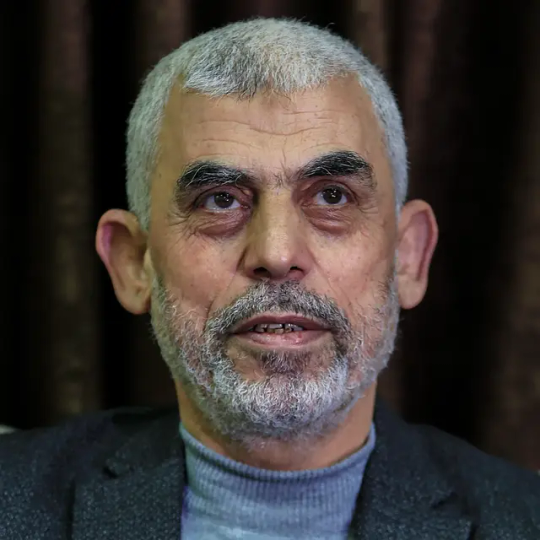
Yahya Sinwar
Hamas leader who plotted the 7 October attack on Israel that triggered war in the Middle East
Yahya Sinwar, the Hamas leader who has been killed by an Israeli patrol in the Gaza Strip at the age of 61, was the principal architect of the attack on Israel on 7 October 2023 that killed 1,200 Israelis, kidnapped 251 hostages, and propelled the Middle East into its greatest peril since the 1973 Yom Kippur war.
The overall leader of Hamas after the assassination of Ismail Haniyeh in July 2024, he was its key strategist before and after 7 October, Israel’s most wanted man and the ultimately pivotal Hamas figure during ceasefire negotiations. Though presumed to have been hiding for most of the year within Gaza’s vast tunnel network, he was killed alone in a ruined apartment in Rafah, according to the Israeli military.
Despite repeated vows by Israeli leaders to assassinate him during their devastating retaliation for the 7 October attack, and after what Israel announced was the killing of his close collaborator Mohammed Deif, the head of Hamas’s military wing, in July 2024, Sinwar was the last survivor of the three Hamas leaders against whom the international criminal court’s chief prosecutor, Karim Khan, sought arrest warrants for suspected war crimes.
Sinwar first came to prominence in 1985 when Sheikh Ahmed Yassin, founder of the organisation that would become Hamas in 1987, put him in joint charge of an armed internal enforcement agency known as al-Majd.
He missed direct participation in the momentous Palestinian events of this century’s first decade, including Hamas’s election victory in 2006, the subsequent imposition of an international boycott, and its armed seizure of full control in Gaza in 2007, because he was in jail. In 1989 he received four life sentences for orchestrating the abduction and killing of two Israeli soldiers and the execution of four Palestinians suspected of cooperating with Israel. According to his interrogators, Sinwar admitted without remorse to personally strangling one victim with his bare hands.
By a historical irony, he was among the 1,027 prisoners released in 2011 by Israel’s prime minister, Benjamin Netanyahu, to free a kidnapped Israeli soldier, Gilad Shalit. The exchange reinforced Sinwar’s belief that such abductions were needed to release Palestinian prisoners. During his 22-year incarceration he assumed a commanding role among Palestinian inmates and tried at least twice to escape. Jail, he later said, had been turned by militants into “sanctuaries of worship” and “academies”. He learned fluent Hebrew, studied Israeli politics and society, and by his own account became “a specialist in the Jewish people’s history”.
Sinwar was born in Khan Yunis in southern Gaza. His father, Ibrahim, and his mother had been forced to flee Majdal, now Ashkelon, as refugees from the 1948 Arab-Israeli war. He would tell fellow inmates in prison, said one, Esmat Mansour, that he had been heavily influenced by conditions in the impoverished refugee camp, with its daily humiliation of queueing for food. He was four when Israel overcame Egypt in the six-day war of 1967 and took control of the Strip. He attended Khan Yunis senior school for boys and then the Islamic University, graduating in Arabic language. Sinwar was active in student organisations fusing Islamism with Palestinian nationalism after the perceived failures of the secular PLO. He was briefly detained in 1982 and again in 1988 after Israel’s discovery of al-Majd weapons.
An autobiographical novel he completed in prison in 2004, called Thorns and Carnations, describes the protagonist Ahmed sheltering with his family during the 1967 war, only to find their dreams of Palestinian liberation shattered by Israel’s victory; Ahmed becomes an Islamist after a cousin convinces him of the religious concept of the waqf – the God-given Muslim land from the River Jordan to the Mediterranean. Infatuated with a young woman, Ahmed ends the relationship – chaste in accordance with strict Muslim custom – because in “this bitter story” there was “only room for one love”: for Palestine.
Also in 2004, Sinwar had a brain tumour removed by Israeli surgeons, detected by a quick-thinking Israeli prison dentist (and later intelligence officer), Yuval Bitton, who had Sinwar rushed to hospital. Over multiple conversations in jail before and after this life-saving episode, for which Bitton was warmly thanked by Sinwar, he recalled the prisoner telling him: “Now you’re strong, you have 200 atomic warheads. But we’ll see, maybe in another 10 to 20 years you’ll weaken, and I’ll attack.”
After his release, Sinwar was elected to Hamas’ political bureau in 2012 and, in what was seen as a shift towards its militarist tendency, to the faction’s Gaza leadership in 2017, replacing Haniyeh, who subsequently succeeded Khaled Mashal as political bureau chief. Hamas was losing popularity after two wars with Israel, in 2008-09 and 2014, and Gaza’s deep impoverishment by the blockade imposed by Israel (and Egypt) since 2007.
Sinwar seemed at times to adopt a relatively pragmatic approach. No ally of Mashal, he worked to restore relations with Iran that Mashal had ruptured by opposing Syria’s president, Bashar al-Assad, in his repression of a popular revolt. But he did not demur when Mashal published a (for Hamas) innovative 2017 document which, without recognising Israel, or abandoning its aspiration for the whole land, indicated it would meanwhile accept a Palestinian state based on 1967 borders – comprising the West Bank, Gaza and East Jerusalem.
In 2018 Sinwar conspicuously appeared at the Great March of Return, a series of unarmed mass protests at the border barrier. Increasingly organised by Hamas, to the chagrin of some civil activists who had devised them, the protests seemed briefly to offer some alternative to armed insurgency, despite the lethal gunfire against them by Israeli troops. Sinwar even wrote (in Hebrew) to Netanyahu, proposing a long-term truce.
But a turning point came in 2021, when Sinwar and Deif are thought to have begun planning for what became the 7 October attack. By then, the 2020-21 Abraham accords between Israel, the UAE and Bahrain had reversed the Gulf countries’ refusal to recognise Israel unless the Palestinians secured a state. How far this – and the fear in 2023 that Saudi Arabia might imminently follow suit – dominated Sinwar’s thinking is unclear. But in his 7 October speech praising Sinwar and Deif for the attack, Haniyeh excoriated the Arab states for seeking “normalisation” with Israel.
Sinwar reacted defiantly during Ramadan in May 2021 when police raided the al-Aqsa mosque compound in Jerusalem, after clashes in the city between Palestinians and rightwing Israelis. When police did not leave the compound by a Hamas-set deadline, Gaza militants fired 150 rockets, Israel responded with airstrikes, and there was a short but intense 11-day war. Sinwar warned that Hamas, whose rockets had reached deeper into Israel than before, had enacted a “general rehearsal” for what would happen “if Israel tries to harm al-Aqsa again”.
Less conditionally, in December 2022 Sinwar addressed Israel at a Gaza rally: “We will come to you, God willing, in a roaring flood. We will come to you with endless rockets, we will come to you in a limitless flood of soldiers.” Hamas would name the 7 October attack the “al-Aqsa flood”.
So secretive was its planning that Sinwar kept its timing and scale – though apparently not that something was being prepared – from most of the Hamas external leadership. Western intelligence agencies also believe he did not confide his intentions in advance to Iran or its Lebanese proxy, Hezbollah.
According to a June 2024 Wall Street Journal report, Sinwar described the huge Palestinian losses in a wartime message to Hamas leaders in Qatar as “necessary sacrifices”. In another, on the seizure of women and children as hostages, but without clarifying whether he was referring to Hamas fighters or others who joined the attack and its accompanying atrocities, he said: “Things went out of control … People got caught up in this, and that should not have happened.”
Though he told hostages he met in the tunnels that they would be protected and exchanged in a prisoner release, one 85-year-old peace activist, Yocheved Lifshitz, freed in the week-long ceasefire in November, said she had challenged Sinwar on whether he was “not ashamed to do such a thing to people who have supported peace all these years. He didn’t answer. He was silent.”
In 2011 he married Samar Abu Zamar, and they had three children, the fate of all of whom is unknown. Sinwar’s brother (and close ally), Mohammed, is still being hunted by Israeli forces.
🔔 Yahya Ibrahim Hassan Sinwar, politician, born 29 October 1962; died 16 October 2024
Daily inspiration. Discover more photos at Just for Books…?
12 notes
·
View notes
Text
Since 1540, a prestigious chain of scholars has held the title of the Regius Professor of Hebrew at the University of Cambridge.
But not one of these scholars of Hebrew and Semitic studies was Jewish — until this year.
In September 2025, Aaron Koller will become the first Jew to join the university’s department of Middle Eastern Studies as the Regius Professor of Hebrew, a role established by King Henry VIII. Koller is packing up from New York City, where he has taught at Yeshiva University, specializing in Hebrew from biblical to medieval texts, since earning his doctorate there in 2009.
According to Koller, it’s no surprise that Jews never made the cut before. Henry VIII, who founded the Church of England along with the professorship, intended it for Anglican churchmen to teach Hebrew in the Anglican tradition. That idea lasted until recently.
“Fifty years ago, it wouldn’t have struck anyone as odd that no Jewish person had held the position,” Koller said in an interview. “It was pretty clearly — not officially, but very clearly — meant for an Anglican professor of the Old Testament.”
Koller — who spent the 2022-23 academic year in Cambridge — credits his predecessor, Geoffrey Khan, with breaking the mold. Khan is not a member of the Anglican Church nor a specialist in the Old Testament, but a scholar of Semitic languages with mixed British, Indian and Iranian ancestry.
In his new role, Koller wants to promote the study of Hebrew texts over the thousands of years between the Hebrew Bible and the modern state of Israel, drawing on Cambridge’s rich trove of manuscripts that includes the Cairo Genizah, the vast collection of medieval manuscripts discovered in Egypt in the late 19th century. Koller hopes that introducing students to these writings will open them up to new angles of studying cultural and intellectual history across the world.
Despite being the first Jewish Regius professor, Koller said he is wary of narrowing the department around “Jewish studies for the Jews.” In the United States, Jewish studies departments tend to attract Jewish students looking to connect with their identity and heritage. That fills a valuable need, said Koller, but he wants to build out Hebrew studies as a home for any student with a humanistic interest in Hebrew — addressing the same historical and philosophical questions that draw people to studying ancient Greek or Latin.
“No one thinks that Greek studies would only be for Greeks,” he said. “Greek studies spend a lot of time trying to explain to the world that this is of universal significance. It’s not for every single person, but it’s for any given person; [they] will find something interesting here. And I very much want to do the same for Hebrew studies in Cambridge.”
12 notes
·
View notes
Text


Gustav Klimt Portrait Missing for a Century Sells for $32 Million
A portrait by Gustav Klimt that was unseen for almost a century has sold for $32 million – the bottom end of its pre-auction estimate.
The “Portrait of Fräulein Lieser,” thought to be one of the Austrian painter’s final works, created huge excitement in the art world, but it ended up selling at the lower end of its valuation of €30 million-€50 million ($32 million to $53.4 million).
Bids started at €28 million and the work went for a hammer price of €30 million. This does not include the auction house’s fees.
The sale price was less than half that fetched by another Klimt painting – “Dame mit Fächer” (Lady with a Fan) – in London last year. The last portrait completed by Klimt became the most expensive artwork ever to sell at a European auction, when it sold for a £85.3 million ($108.4 million).
The “Portrait of Fräulein Lieser” had long been considered lost, according to Vienna auction house im Kinsky. However, it recently emerged that it had been privately owned by an Austrian citizen.
“The rediscovery of this portrait, one of the most beautiful of Klimt’s last creative period, is a sensation,” the auction house said in a press statement on its website prior to its sale on Wednesday afternoon.
The intensely vivid and colorful piece had been documented in catalogues of the artist’s work, but experts had only seen it in a black and white photo.

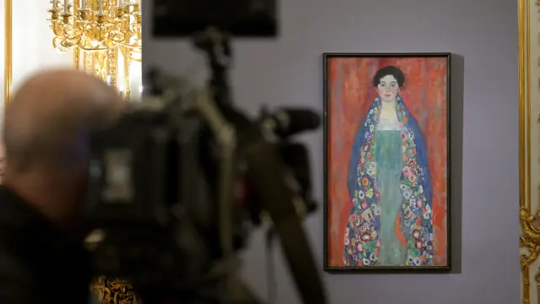

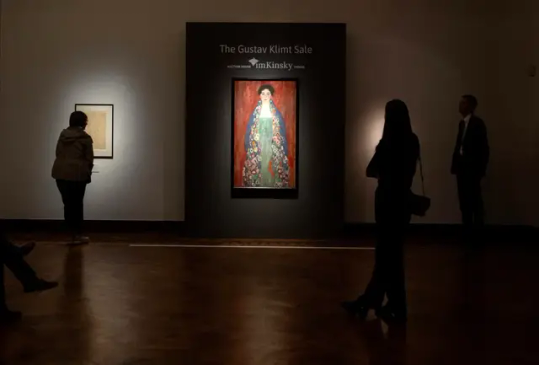
The sitter is known to have been a member of a wealthy Austrian Jewish family who were then part of the upper class of Viennese society, where Klimt found his patrons and clients. Nevertheless, her identity is not completely certain.
Brothers Adolf and Justus Lieser were leading industrialists in the Austro-Hungarian empire. Catalogues of Klimt’s work state that Adolf commissioned the artist to paint his teenage daughter Margarethe Constance. However, new research by the auction house suggests Justus’ wife, Lilly, hired him to paint one of their two daughters.
The statement on the auctioneer’s website reveals that the sitter – whoever she was – visited Klimt’s studio nine times in April and May 1917. He made at least 25 preliminary studies and most likely began the painting in the May of that year.
“The painter chose a three-quarter portrait for his depiction and shows the young woman in a strictly frontal pose, close to the foreground, against a red, undefined background. A cape richly decorated with flowers is draped around her shoulders,” the auction house said.

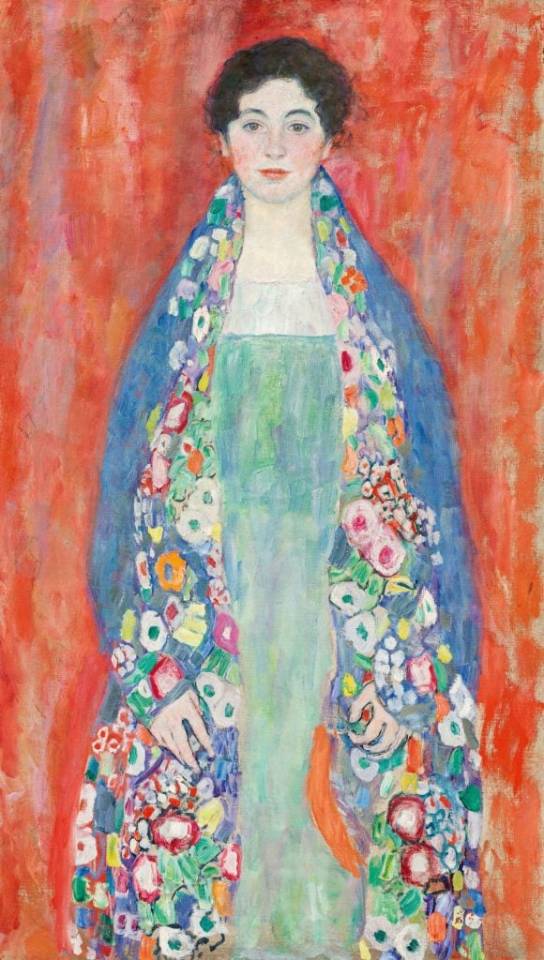
It added: “The intense colors of the painting and the shift towards loose, open brushstrokes show Klimt at the height of his late period.”
When the artist died of a stroke the following February, the painting was still in his studio — with some small parts not quite finished. It was then given to the Lieser family.
Its exact fate after 1925 is “unclear,” according to the auction house.
“What is known is that it was acquired by a legal predecessor of the consignor in the 1960s and went to the current owner through three successive inheritances,” the statement said.

The painting was to be sold on behalf of its Austrian owners, who have not been named, along with the legal successors of “Adolf and Henriette Lieser based on an agreement in accordance with the Washington Principles of 1998,” the auction house said.
Established in 1998, the Washington Principles charged participating nations with returning Nazi-confiscated art to their rightful owners.
Claudia Mörth-Gasser, specialist in modern art at im Kinsky, explained the situation in an email.



She said the auctioneer checked the painting’s history and provenance “in all possible ways in Austria,” adding: “We have checked all archives and have found no evidence that the painting has ever been exported out of Austria, confiscated or looted.”
But by the same token, she added: “We have no proof that the painting has not ever been looted in the time gap between 1938 and 1945.”
And this is the reason “why we arranged an agreement between the present owner and all descendants of the Lieser family in accordance to the ‘Washington Principles,’” she said.
Klimt’s portraits of women “are seldom offered at auctions,” the press release stated. It continued: “A painting of such rarity, artistic significance, and value has not been available on the art market in Central Europe for decades.”
By Lianne Kolirin.
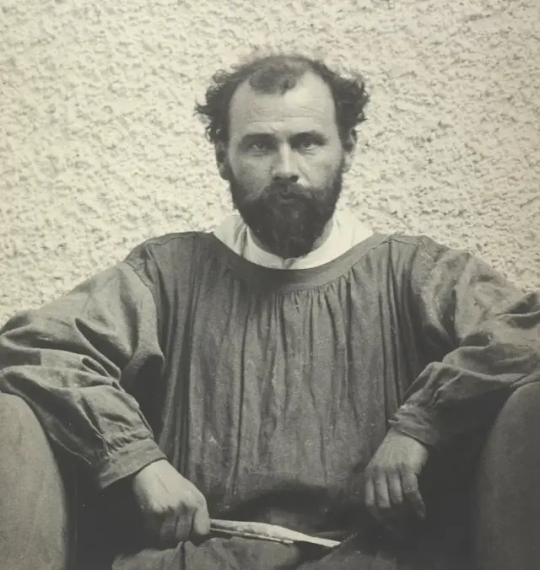
#Gustav Klimt#Gustav Klimt 'Portrait of Fräulein Lieser'#Gustav Klimt Portrait Missing for a Century Sells for $32 Million#austrian artist#painter#painting#art#artist#art work#art world#art news
14 notes
·
View notes
Note
19 and 17 for the ask game
Talk to me about the minutiae of your current WIP. Tell me about the lore, the history, the detail, the things that won’t make it in the text.
Note: I have more than a few WIPs going on but I checked with @corvidcrafts273 and am focusing on Fell, the Good Omens human au where Crowley works in corporate and Aziraphale works in a nearby university library, but Crowley is already engaged to marry someone else...
I know you're interested in backstory, and we are going to learn more about the backgrounds of all the main characters as the story progresses. I have most of the major details all worked out, though I give some space for the characters to surprise me. The chapter with the receptionists gives us some clues about Crowley's past; all of the hints are accurate. I can tell you that Crowley and Asmodeus have been together for a very long time, since high school. All of the main characters' respective family backgrounds are a big part of the mystery, so to speak, especially Mr. Fell, whose past will be the hardest to suss out since he is the most secretive.
O minutiae! (Set to the Orff O Fortuna). One thing that I decided while writing Fell was to entirely make up the city and the university without ever naming any specifics, while setting it in the real world. The setting is a combination of cities I've been to, universities I've visited, and even a few different libraries (not all university). To make things seem more plausible, I looked up things like corporate structure, library job descriptions, historic library renovations (since the library in the story is a combination of an old historic building and a modern mid-century build), weather details for a plausible large city perhaps on the eastern seaboard of the US, specific details about cell biology, various majors and graduate degrees in STEM and in classics, 19th century forgers, airline seating diagrams… For example that one sentence about Mr. Fell going to a talk about the Upanishads in chapter 4 took a lot more work and double/triple checking than you'd imagine for one sentence. I like to try to make experts at least sound like experts even if I'm not a specialist myself. (FYI I am almost certain Mr. Fell knows Sanskrit.)
The company Crowley works for is named after the 'celestial house of study' known as Metibta (Source: Jewish Encyclopedia article on Asmodeus). Metibeta's salary model is based on a Seattle company that became famous for a $70k minimum wage, which is why even the receptionists can afford to buy homes. Crowley disparagingly calls herself an executive assistant but is actually a Vice President. However, that bitterness comes from the fact that Crowley should be Metibeta's CEO but is not, for various reasons that are revealed later.
Asmodeus' surname Ashmedai (his mother's surname) comes from the same source as above and is either a variant of the name or a different entity altogether: apparently the jury's still out on that one. Asmodeus is actually a nickname. He does have a fairly ordinary given name, but we won't find that out for a while. In fact, all the main characters go by names that are not the ones they were given which will be revealed in time.
It will be in the story a lot later, but something that goes unspoken for quite some time in this first part is that Asmodeus' executive assistant is the Disposable Demon aka Eric and Crowley's executive assistant is Eric's brother, D'Eric (pronounced like Derek). They're identical brothers that ended up being hired together. Eric was the one who came to interview with Asmodeus and D'Eric came to support him but ended up being hired along with Eric. Besides loyalty to the executives they work for, the brothers get along really well and coordinate Crowley and Asmodeus' schedules nearly perfectly. Their offices are adjacent and possibly connected.
The books and artworks referenced are real, except that astronomy book, which is from the show. In fact, it's been fun to try to weave in aspects of the original novel or show, like Crowley's tattoo. Crowley doesn't have a tattoo in this story, but the design is on Asmodeus' business card. I don't remember if it's discussed yet, but the design is also worked into the engagement ring. Speaking of rings, Mr. Fell does have a gold signet ring, but doesn't wear it, for reasons that are yet to be revealed.
Currently in the story, I am writing at around the 80k mark, which is way further than what's available online so far and a LOT has happened. In the past few weeks of writing I've done a lot of research on hotels, restaurants, and local dining in foreign locales. Recently I found a very interesting regional pizza to include in the story that apparently is just topped with a lot of chopped cabbage (you can guess the location).
One more thing that's not obvious in the text (sorry, I know this is long): normally both Crowley and Asmodeus live fairly modest lives since their company doesn't pay them extravagant wages, though Asmodeus does have inherited wealth to draw on. They fly commercial when they do fly (usually business class because they're both tall, and with a lot of mileage points etc.), and don't often go out to fancy restaurants except for work or a special occasion. They're both workaholics, with Asmodeus being far worse than Crowley. I don't think either of them have been on a real vacation in years. Most of their joint travel seems to be centered around Asmodeus going to meetings or conferences and Crowley tagging along, though they seem to take mini vacations of 2-3 days around certain holidays.
Tell me a story about your writing journey. When did you start? Why did you start? Were there bumps along the way? Where are you now and where are you going?
I've actually been writing for a lot longer than what's available online. I have always been an avid reader, and iirc my first attempts were scraps of stories in middle school that I didn't know how to expand. In high school, I wrote a lot of poetry -- not very good poetry -- and wrote my first longish story. It wasn't very good but I remember enjoying the process. I still write poetry sometimes, though it's mostly unpublished. I also spent many years very seriously writing academic papers, which helps a lot in terms of better understanding structure.
Probably the largest bump along the way was having clinical depression. I didn't write much in those years. But at one point, when my life had more purpose and my mental health improved, I realized that writing helped me with stress and gave me some meditative calm, so I started writing more regularly. I thought things were better but the pandemic years and the years after have been really hard. There was period during some of the worst of the lockdowns when I wasn't writing much, and when I returned to it, some of the stories took strange turns. The Seventh Prince of Hell, for example, was originally meant to be much lighter than the Mistakes series but subsequent stories after the first one ended up in some ways much more serious.
Despite the bumps, over time I became modestly disciplined as a writer and I write almost every day now, for at least a couple hours. I'm about to cross the 1.5 million word mark on ao3, it will probably happen in the next few weeks or so, depending on how much I feel like posting.
Currently I have planned scenes for 1) Canterbury Tales with a run-in on the road with the Pardoner, Summoner, Canon, and Canon's Yeoman, 2) modern au travel continues and truths begin to seep out, 3) a night at the opera for Mistakes: Together, 4) Hallmark Christmas movie parody (human sacrifice is involved), and 5) need to figure out some stuff for that Worthy Love story. It got put aside during a prolonged period of stress this fall and I can't quite remember what my short-term plans for the story were though I know the long-term goals.
A friend and former prereader of mine sometimes tells me that I should file off the serial numbers and publish professionally, but I'm rather fond of the artistic license of just writing the stories and characters I'm interested in exploring, and throwing it out in the wind, hoping someone will see it. So the answer is, in general I don't know where I'm going, but I have a rough idea and I'll follow it to the end. Thank you for reading, thank you for the interest, and thank you for seeing me, I appreciate it!
#writing#aziraphale#crowley#good omens#good omens fanfic#good omens fanfiction#human au#ask meme replies
3 notes
·
View notes
Text
Instituto Cenvantes: Presentación del libro HISTORIA DE LOS JUDÍOS EN LA ESPAÑA CONTEMPORÁNEA
🇪🇸 El 15 de agosto de 2024 a las 18:30 h, el Instituto Cervantes de Tel Aviv acogerá la presentación del libro "Historia de los judíos en la España Contemporánea" del historiador Jacobo Israel Garzón. Esta obra, que consta de tres tomos, es el resultado de una exhaustiva investigación sobre la presencia judía en la península ibérica. Durante el evento, participarán Susy Gruss y Silvina Guesser, expertas en literatura judeoespañola e historia cultural de España, respectivamente.
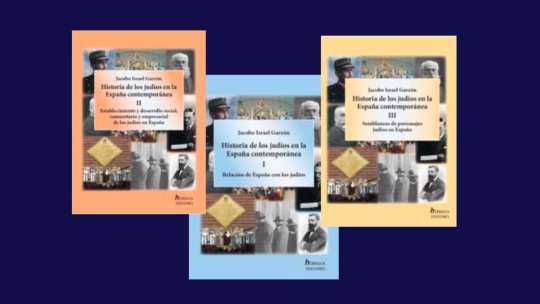
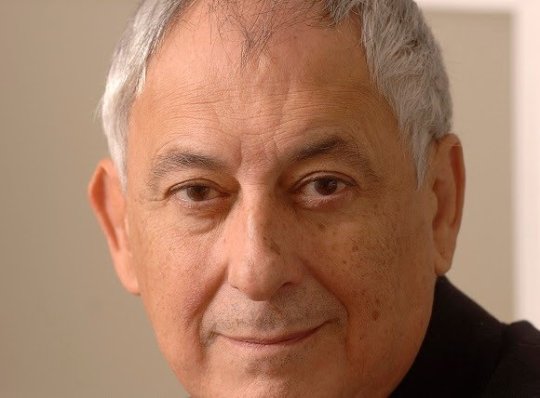
🇺🇸 On August 15, 2024, at 6:30 PM, the Instituto Cervantes in Tel Aviv will host the presentation of the book "History of the Jews in Contemporary Spain" by historian Jacobo Israel Garzón. This three-volume work is the result of extensive research on Jewish presence in the Iberian Peninsula. The event will feature contributions from Susy Gruss and Silvina Guesser, specialists in Judeo-Spanish literature and Spanish cultural history, respectively.
#judaísmo#judaism#jewish#cultura judía#israel#jumblr#judíos#Instituto Cervantes#Entrada libre#hasta completar aforo#Tel Aviv#Jacobo Israel Garzón#jerusalem#Israel#Universidad de Bar Ilan#Literatura contemporánea#español#Literatura contemporánea en judeoespañol#Literatura#Literatura judía#Literatura judeoespañola#españa#spain#península ibérica#iberian peninsula#Universidad Hebrea de Jerusalén#jerusalén
3 notes
·
View notes
Text
Jo's school, the war, those Germans and how to write a good character purely by accident.
A literary essay that came to my mind yesterday, through the conversation with @nocturnalazure
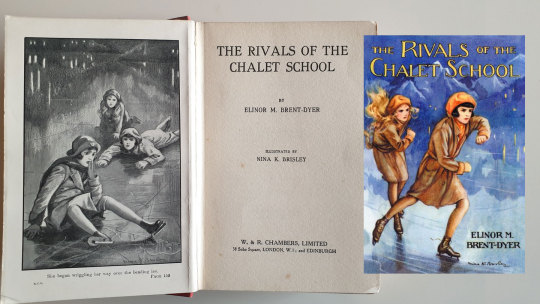
Originally I wanted to include this in the favourite characters tag, but it required so much background information: It's easy to find good characters in well-written books. One of my favourite characters in a badly written book is Frieda Mensch from the Chalet school series (the blonde girl, in the back on both images)
I discovered the Chalet School series at a jumble sale a few years ago, and I enjoy reading it because I like to imagine what could have been done with some good plotting skills. Also it's full of motifs that only made sense in the mid 20th century (the chain-smoking lung specialist) and the German spoken by the characters is simply hilarious. (Onkel Reise - a very tall man.)
Interestingly, the series is heavily inspired by Little Women and its sequels, especially Jo's school. It's about the English sisters Josephine (Joey) and Madge (not Meg!) Bettany who set up an international school in Austria around 1930. There's also an unrelated little Amy around.
Frieda Mensch is an Austrian girl who goes to that school and becomes a friend of Joey's. So far that's nothing special, the series is literally about Joey being everyone's supportive friend. In volume two the sisters spend Christmas with Frieda's family in Innsbruck, which makes her stand out a little. Then, because her first name means "peace" and her surname means "human", the author assigned her the role of the peacemaker in her class. She's portrayed as a serious, law-abiding girl, but of course schoolgirls must also be good sports and know when to break the rules. Even if it's possibly an accidental contradiction, this gives her an implicit conflict. Gradually she becomes the main loyal friend who supports Joey if needs be (like on nightly ice-skating-rescue-missions ^).
When the girls in the books are around 19 and just left school, in real life the annexation of Austria by Nazi Germany hit. By the time the school could be fictionally evacuated, war had begun too. Suddenly this Austrian girl whose name means "peace" and "human" becomes hugely symbolic. Frieda has to flee to England, one of her friends' father is tortured to death, her fiancée is also shortly imprisoned and suddenly she's a girl with a fate. She also helps Joey, who is married by then and has recently given birth, to cross the Channel. At the end of that volume Frieda gives a speech to what's left of the school, about peace and acting humanely despite political conflicts. Wars change many lives and reveal unknown strength in some people - sometimes this is even true for fictional characters.
(If I were set the task to write a novel in which an international school defies the Nazis, my first thought would be that they might have some Jewish students they must protect. Interestingly, this thought never crossed the author's mind. The Nazis turn their full force on this English school because the girls privately vowed to always keep up their girl guide ideals, even the Germans and Austrians from whom they're about to be separated. While violence against Jews is mentioned in the story, it shows how little the threat to them was taken seriously abroad. It also shows the hope that the decent-minded Germans might get the upper hand again after a while. It's strongly biased in its own way, but it's a perspective one doesn't find in books that were written with the whole history in mind. That's why I enjoy historic fiction so much.)
If I ever get so far with the McCarrics, I'm going to steal a lot from Highland Twins go to Chalet School. In fact I've already named Shiena after a character from that book.
13 notes
·
View notes